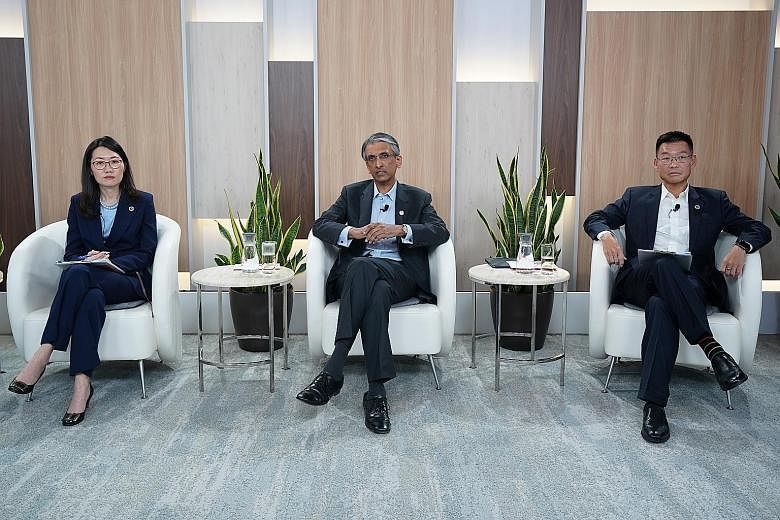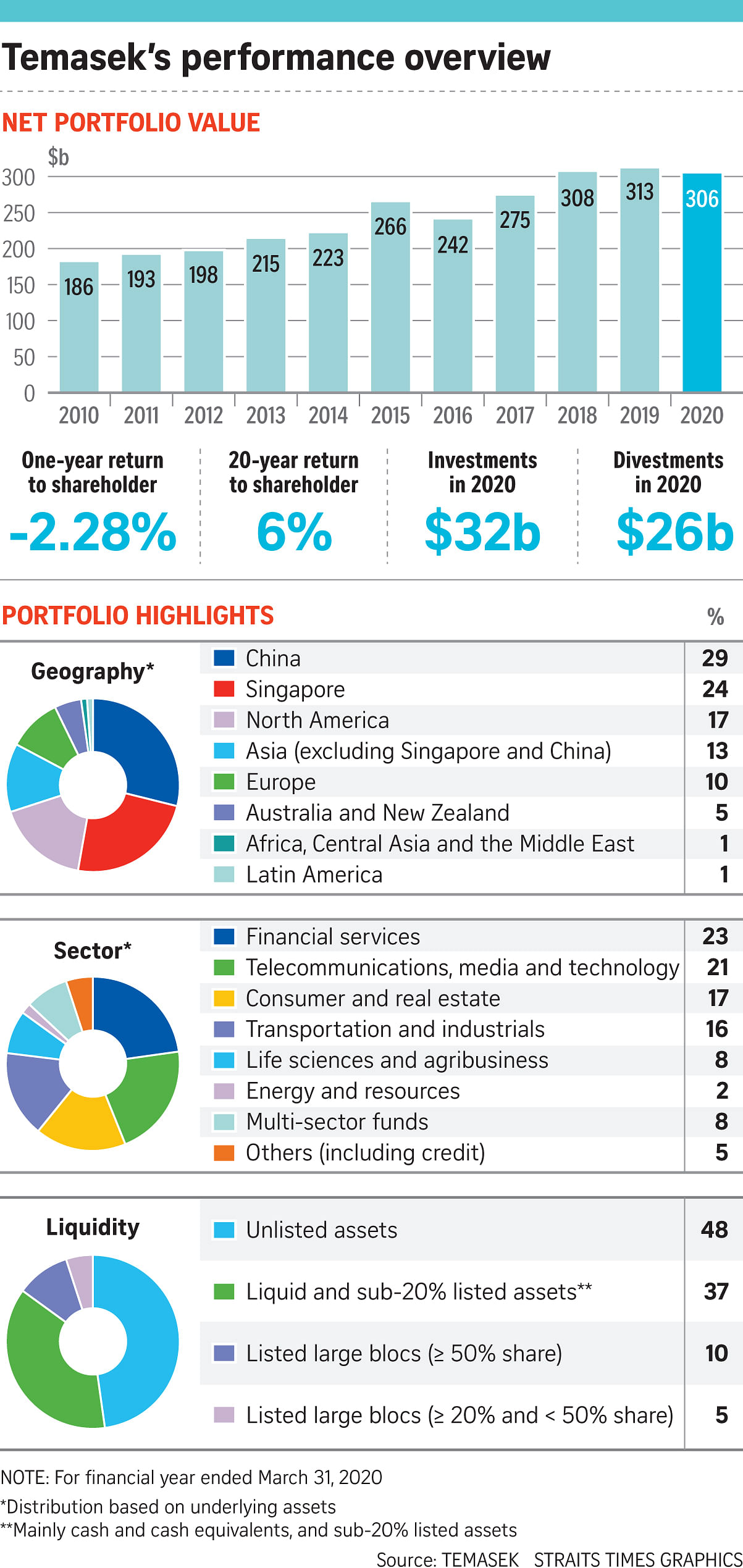Singapore investment company Temasek's one-year shareholder return fell into negative territory in its latest financial year, with the firm's net portfolio value likewise taking a dip from the year before.
Temasek's net portfolio was valued at $306 billion as at March 31, 2020. That is 2.2 per cent lower than last year's record $313 billion, the company said in its annual review yesterday.
Temasek's reported results yesterday, which confirm the preliminary figures released in July, reflected the impact of the coronavirus pandemic on global financial markets.
Its one-year return for shareholders came in at minus 2.28 per cent, compared with 1.49 per cent the previous year. Over the longer term, its total shareholder return over 10 years was 5 per cent, down from 9 per cent a year ago.
Unlisted assets made up 48 per cent of Temasek's portfolio in the past financial year - their highest recorded share - as the investment firm continues to increase its exposure in non-listed companies.
Mr Yeoh Keat Chuan, senior managing director of Temasek International's enterprise development group and deputy head for Singapore projects, noted that the percentage of unlisted assets in Temasek's portfolio has grown steadily over the years.
He added that unlisted assets accounted for just 23 per cent of the company's portfolio in 2010.
Among some of Temasek's unlisted assets are port operator PSA International and real estate player Mapletree Investments.
"(This high percentage of unlisted assets) is very much in line with the structural trends that we are seeing... and that is where opportunities lie," Mr Yeoh said.
Financial services remained the largest sector in Temasek's port-folio at 23 per cent, as it increased exposure in the payments sector and other non-bank financial services companies to benefit from the accelerating digitalisation of the industry.
In particular, Temasek increased its investments in payment providers PayPal, Mastercard and Visa, and also put money in Blend, a United States-based digital lending platform for mortgages and consumer banking.
Sustainability also remains a key focus for Temasek, as it closed the year achieving carbon neutrality as a company.
Temasek International chief executive Dilhan Pillay said: "We recognise the urgent need for businesses with innovative solutions to improve lives and increase social resilience. This has led us to accelerate our investments into low-emission and resource-efficient companies, including in the areas of energy, food, waste, water, mobility and urban development."
In the past year, Temasek backed Singapore-based solar energy firm Sunseap and increased its exposure to alternative protein firms such as Impossible Foods and Perfect Day.
Temasek has also been active in the technology and life sciences sectors over the past financial year, capitalising on growth trends in these areas.
Among its new portfolio companies are Duck Creek Technologies, a software provider to the property and casualty insurance industry, and integrated healthcare system CareBridge.
CIMB Private Banking economist Song Seng Wun said Temasek's results, like all companies whose financial year ends in March, were inevitably affected by the market plunge that month.
"This is especially so for Temasek, where most of its portfolio is in equities. From a legacy standpoint, it still holds a large chunk of Singapore equities, such as through the (local) banks and Singapore Airlines (SIA)," he said.
Temasek invested $32 billion over the past fiscal year and divested $26 billion of assets during that time. This investment amount was larger than the previous year's $24 billion.
Mr Song said there could be opportunities for further investments for Temasek. "Any time there is a market correction, it creates opportunity," he added, but cautioned that there are also challenges, given that markets outside the US have rebounded sharply.
At yesterday's virtual press conference, Mr Pillay addressed a question on Temasek's plans for two of its portfolio companies - offshore and marine players Keppel Corp and Sembcorp Marine. He said: "It is not really for us to direct things at all, that is not our governance framework."
Both Keppel and SembMarine are listed companies, and it is up to the two boards to decide what each company's business models are going to be, Mr Pillay added.
Temasek withdrew its partial offer for Keppel last month and has mopped up one billion of SembMarine's unsubscribed rights shares.
Responding to whether Temasek would be keen to lead another round of fund-raising for SIA, following its rights issue of shares earlier this year, Mr Pillay replied: "As of now, I think SIA is managing its capital the best it can."
Pointing out SIA's strengths and international reputation, he added: "They have a resilient workforce, and I believe when the post-(Covid-19) world allows travel to come back in, they will be able to continue to operate the same way as they did before, albeit within a different environment."
Temasek deputy chief financial officer and head of financial services Png Chin Yee said the unpredictability of Covid-19 and geopolitical issues pose near-term challenges.
"We will stay watchful and remain disciplined in our investment approach as we focus on building a portfolio that will benefit from policy tailwinds and is resilient in the long term," she said.



